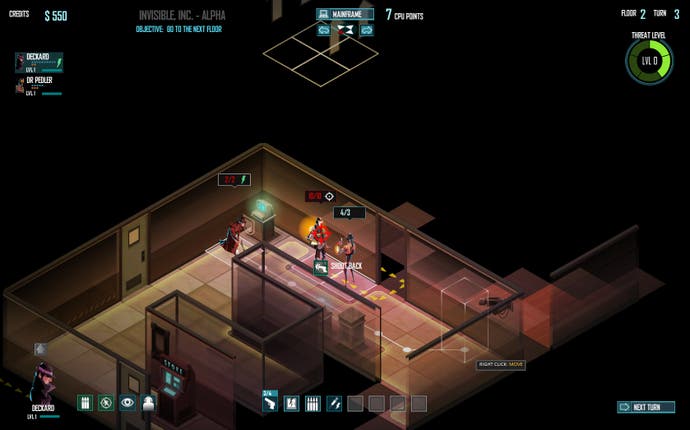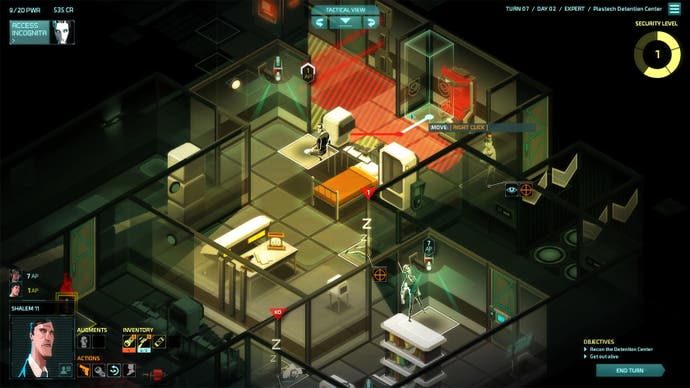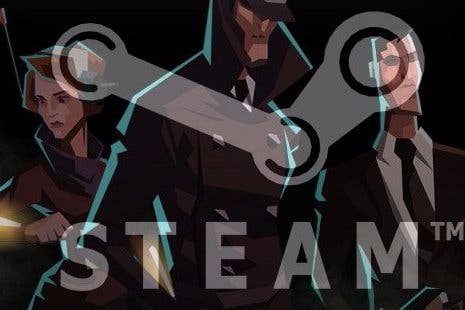"Weird and hard and super awkward": Klei talks Invisible, Inc. and Early Access
From Dredd to XCOM (with a little help from Craigslist).
"If we'd done it all internally, I don't know if we would have ever realised that we shouldn't do a dungeon crawler," explains designer James Lantz with a laugh. We are on Skype, and we're talking about Invisible Inc, the game that he's been working on for the last few years - and the game that, since last August, has had a new influx of design consultants.
Invisible, Inc. has changed a lot since its inception - as an example, it was once called Incognita before, thankfully, the forces of punmanship prevailed - but what's astonishing is how much it's changed since the first Early Access build got into the hands of the community. It's astonishing how quickly Klei Entertainment has iterated, certainly, but it's also astonishing how much the team has listened.
"Originally we had this vision that was inspired by Dredd or maybe The Raid," says Lantz. "You're in this big apartment building and as you complete each mission, you're climbing to higher floors. Yeah, like a dungeon."

This theme would eventually give way to a world map instead, when it became clear that Early Access players preferred the idea of something a little more XCOM-inspired. That sounds like a superficial change, and I guess it is, but it would lead onto a couple of much more significant revisions later down the line: an added dash of global conspiracy in the storyline, and of course, the inclusion of that clever little timer, always drawing you closer to the game's big finale.
With reliable updates (originally every couple of weeks) came a reliable stream of feedback from those that had bought into both a turn-based stealth game and also, importantly, its future development.
"Throughout the whole process we were also bringing in Craigslist people," says Lantz. "That was valuable, but the thing that Early Access offered that we wouldn't have had otherwise was those people who were excited about the development, but also talking about it without knowing that we were listening.
"You'd get that in the forums sometimes, but also YouTube Let's Plays where people are creating content for their audience, rather than just playing for us. They'll make fun of things that are just stupid, which doesn't tend to happen if you're sitting right behind them."
Continued input from players has helped shape the game that we see today, but Lantz is wary of overselling the Early Access dream as I quiz him about the processes involved. Seems it's not all constructive forum threads and good vibes.
"There's a lot of stuff that's hard about it too," Lantz is eager to point out. "Writing update posts and maintaining that transparency with the community eats into development time. We would have iterated much more quickly without those concerns."
With eleven major updates since August and a whole list of smaller tweaks and fixes along the way, iteration is likely a word that Klei has become somewhat familiar with by this stage. But when you're releasing updates for an audience that has already paid up front, you really don't want to risk the possibility of broken builds. Everything has to be polished and polished and polished, and ready to withstand thousands of eager players. This must change the way a team works, right?
"You can make the argument that, yeah, if we hadn't been in Early Access we might have had a more ambitious scope," says Lantz. "The game would have looked different but I do tend to think that our scope was pretty ambitious as it was. Without Early Access we might have just had our heads in the clouds."

This hasn't been the team's only experience with Steam's paid alpha programme, of course. Don't Starve has been used as something of an "Early Access spirit guide" according to Lantz, although he admits the two games aren't really as comparable as they initially hoped.
"Invisible, Inc. is much more of a launch title," he explains. "Whilst Don't Starve has the much longer tail, it's still getting X amount of sales per day and that doesn't really change all that much. With Invisible, Inc. we're hoping for a spike on release day and then less of a tail, in the same respect. I'm nervous about it."
As we chatted, Lantz was quite open about the modest success of Invisible, Inc. when compared to Klei's previous game. "It's done okay throughout Early Access, but not amazingly," he admits. I wonder if those initial comparisons to Don't Starve, which has become something of a phenomenon, created fairly steep expectations.
I also wonder if this has turned the studio away from using this funding model again in the future. "No!" says Lantz. "I think we really like Early Access as a team. It grounds us and provides really good feedback that you can't get anywhere else. We like involving people in the development process; showing them that making a game is weird and hard and super awkward!" He laughs. "It's never quite what you expect."










